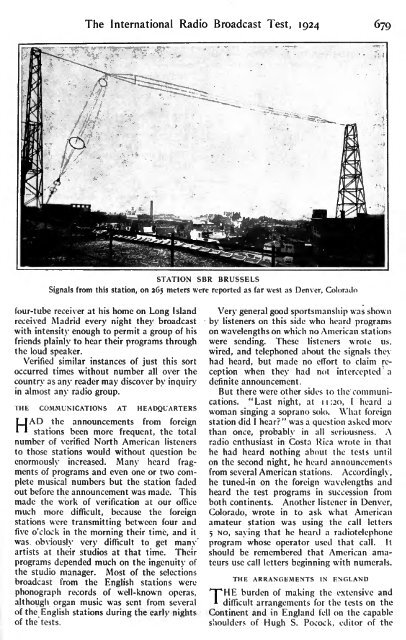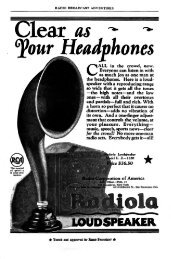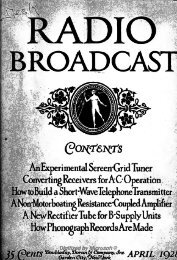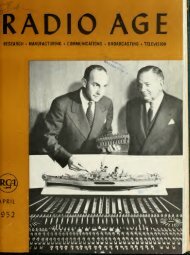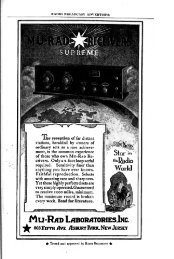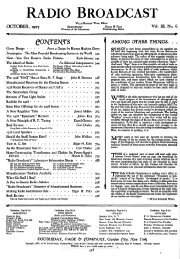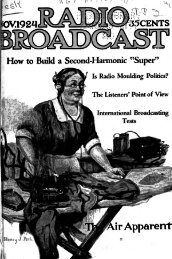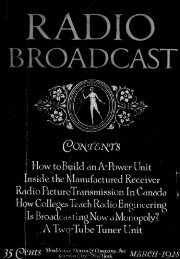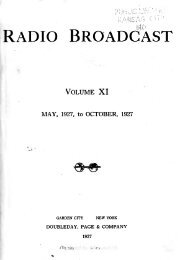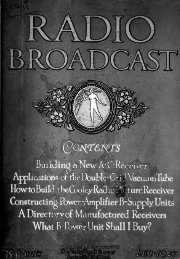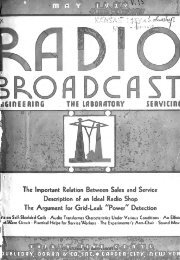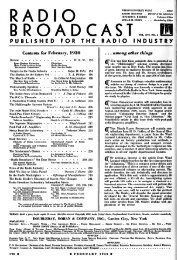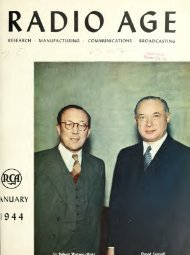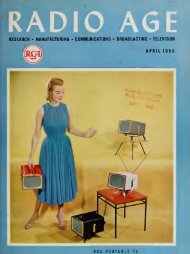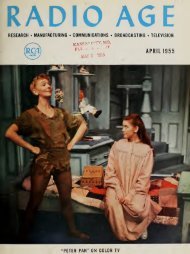Radio Broadcast - 1925, February - 113 Pages ... - VacuumTubeEra
Radio Broadcast - 1925, February - 113 Pages ... - VacuumTubeEra
Radio Broadcast - 1925, February - 113 Pages ... - VacuumTubeEra
You also want an ePaper? Increase the reach of your titles
YUMPU automatically turns print PDFs into web optimized ePapers that Google loves.
The International <strong>Radio</strong> <strong>Broadcast</strong> Test, 1924<br />
STATION SBR BRUSSELS<br />
Signals from this station, on 265 meters were reported as far west as Denver, Colorado<br />
four-tube receiver at his home on Long Island<br />
received Madrid every night they broadcast<br />
with intensity enough to permit a group of his<br />
friends plainly to hear their programs through<br />
the loud speaker.<br />
Verified similar instances of just this sort<br />
occurred times without number all over the<br />
country as any reader may discover by inquiry<br />
in almost any radio group.<br />
THE COMMUNICATIONS AT HEADQUARTERS<br />
HAD the announcements from foreign<br />
stations been more frequent, the total<br />
number of verified North American listeners<br />
to those stations would without question be<br />
enormously increased. Many heard fragments<br />
of programs and even one or two complete<br />
musical numbers but the station faded<br />
out before the announcement was made. This<br />
made the work of verification at our office<br />
much more difficult, because the foreign<br />
stations were transmitting between four and<br />
five o'clock in the morning their time, and it<br />
was obviously very difficult to get many<br />
artists at their studios at that time. Their<br />
programs depended much on the ingenuity of<br />
the studio manager. Most of the selections<br />
broadcast from the English stations were<br />
phonograph records of well-known operas,<br />
although organ music was sent from several<br />
of the English stations during the early nights<br />
of the tests.<br />
Very general good sportsmanship was shown<br />
by listeners on this side who heard programs<br />
on wavelengths on which no American stations<br />
were sending. These listeners wrote us,<br />
wired, and telephoned about the signals they<br />
had heard, but made no effort to claim reception<br />
when they had not intercepted a<br />
definite announcement.<br />
But there were other sides to the communications.<br />
"Last night, at 11:20, I heard a<br />
woman singing a soprano solo. What foreign<br />
station did I hear" was a question asked more<br />
than once, probably in all seriousness. A<br />
radio enthusiast in Costa Rica wrote in that<br />
he had heard nothing about the tests until<br />
on the second night, he heard announcements<br />
from several American stations. Accordingly,<br />
he tuned-in on the foreign wavelengths and<br />
heard the test programs in succession from<br />
both continents. Another listener in Denver,<br />
Colorado, wrote in to ask what American<br />
amateur station was using the call letters<br />
5 NO, saying that he heard a radiotelephone<br />
program whose operator used that call. It<br />
should be remembered that American amateurs<br />
use call letters beginning with numerals.<br />
THE ARRANGEMENTS IN ENGLAND<br />
THE burden of making the extensive and<br />
difficult arrangements for the tests on the<br />
Continent and in England fell on the capable<br />
shoulders of Hugh S. Pocock, editor of the


